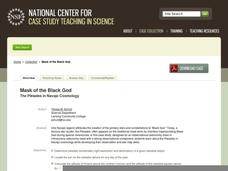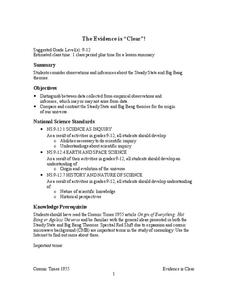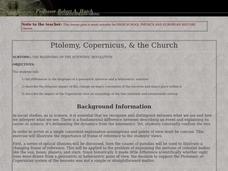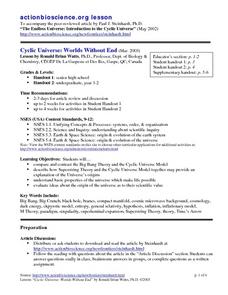McGraw Hill
Cosmology
Explore the birth and possible death of the universe. An interactive simulation allows learners to manipulate the Hubble Constant to model the expansion of the universe from birth. Varying the constant provides different scenarios for...
Curated OER
Cosmology
In this space science worksheet, students find the words that are related to the study of cosmology and the answers are found at the bottom of the page.
Glynn County School System
Cosmology
The past, the present, and the future ... there's so much to discover about the galaxy. Scholars learn about the creation of the universe, its current structure, and how it is changing. The PowerPoint presentation begins with a...
Curated OER
Heliocentric and Geocentric Models
In this worksheet, students read an informational article and view drawings of the two models. In this comprehension worksheet, students answer twelve questions.
Curated OER
Cosmic Poetry: Words and Ideas Bring the Cosmos to Life
Sixth graders study the cosmos and their thoughts and feelings about the universe. In this cosmic poetry lesson plan students create a venue where they can "safely" ask questions and discuss ideas.
Curated OER
The Big Bang-Cosmic Expansion
In this Big Bang worksheet, students are given the equation used to determine the rate at which the universe is expanding according to the Big Bang theory. Students solve 4 problems using this equation. They find the integral for time,...
Curated OER
The Milky Way: A Mere Cloud in the Cosmos
In this galaxy worksheet, students calculate the volume of the Milky Way Galaxy, they determine the total mass, the density and the volume of the Milky Way Galaxy. They also solve 2 problems about the volume and size of the universe in...
Curated OER
Ptolemy vs. Copernicus
Students list differences in the diagrams of a geocentric universe and a heliocentric universe. They students describe the religious impact of this change on man's conception of the universe and man's place within it. Students describe...
National Center for Case Study Teaching in Science
Mask of the Black God
Finally, an astronomy lesson for the high schooler! Explorers are able to read star maps for finding objects in the night sky by determining celestial coordinates. In particular, they locate the Pleiades and read about a Navajo legend...
Curated OER
An Introduction to the Night Sky and Movement Astronomy
Basically, this is an interactive exploration of educational astronomy software and an app. Young astronomers discover how the apparent motion of the sky relates to Earth's movements and the position of the observer. It is out of this...
Virginia Department of Education
Modeling the Big Bang Theory
Young astronomers learn about the Big Bang Theory and redshift through a hands-on activity in the last installment of a three-part series. Participants draw dots on balloons and then inflate them to model how galaxies moved farther apart...
Curated OER
Hanal Pixan
Students research the culture of Mexico. In this Mexican culture lesson, students view a PowerPoint presentation about the culture of Mexico and the students take notes. Students write an essay about what they have learned.
Curated OER
The Age of Reason and Enlightenment
A presentation that truly covers the age of reason and enlightenment. Nearly every facet, event, and key player in 18th Century Age of Enlightenment is covered. The information is clear, easy to follow, and lends itself well to note...
NASA
The Evidence is “Clear”!
Do you think you know better? Become a scientist and prove it. Scholars review the evidence for two different theories of the origins of the universe. They notice the empirical observations as well as the inferences to determine which is...
NASA
Century Timeline
Scholars use the Cosmic Times and the Internet to create a timeline of events from 1916 when Einstein presented the Theory of General Relativity to 2016. Scientific discoveries are the main focus, then pupils add in events from culture,...
Global Oneness Project
Architectural Wonders
Angkor Wat, a UNESCO World Heritage Site located in Cambodia, is the focus of a lesson that asks class members to consider factors that could result in the destruction of these archeological treasures. Pupils listen to a...
Curated OER
Understanding the Cosmic Microwave Background (CMB)
How did our universe really begin? Explore the Science Big Bang Theory and Cosmic Microwave Background (CMB) with this multiple activity-based lesson that demonstrates that the increase of density due to the decrease of temperatures,...
Curated OER
Women and Korean Literature
Students read a text about women in Korean and their role in Korean literature. In this Korean literature lesson, students read a text by Helen Koh to learn about women writers in Korea.
Curated OER
What a Cosmic Web We Weave
Students explore, using journals and discussion in small groups, how the universe has evolved since the theoretical Big Bang and create dramatizations of various eras in cosmic evolution.
Curated OER
The Scientific Revolution in England and Europe
Learners read and discuss Scientific Revolution information sheet and the diagram concerning the causes of the Scientific Revolution. They construct a timeline including Aristotle, Democritus, Copernicus, Bacon and Descartes along with a...
Curated OER
The Energy of Empty Space
In this energy in empty space instructional activity, students use an equation for Cosmic Inflation to solve eight problems. They find the domain and range of the function of the equation, they determinethe axis of symmetry, they find...
Curated OER
Ptolemy, Copernicus, & the Church
High schoolers determine the difference between a geocentric universe and a heliocentric universe.
Curated OER
Cyclic Universe: Worlds Without End
Students compare and contrast the Big Bang Theory and the Cyclic Universe Model. They explain basic properties of the univers which make life possible. They evaluate ideas about the origin of the universe as to their scientific value.
Curated OER
Astronomy Class
In this space science worksheet, students find the words associated with the basic terms of Astronomy. The answers are located at the bottom of the page.

























